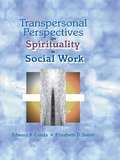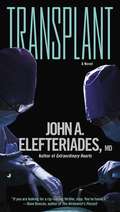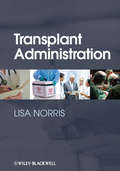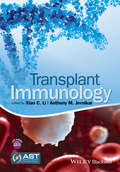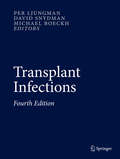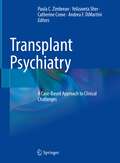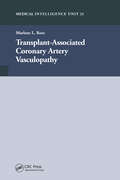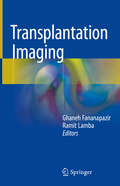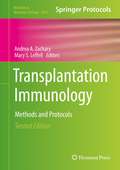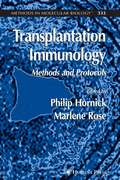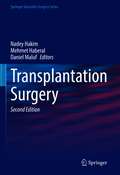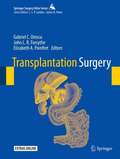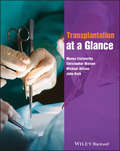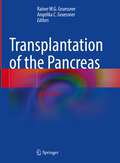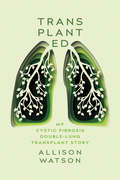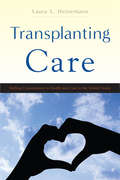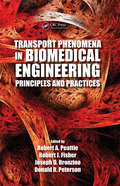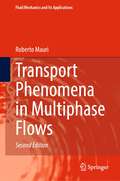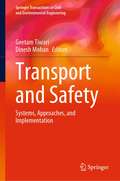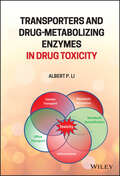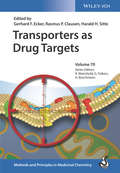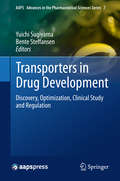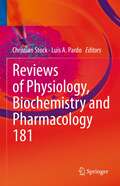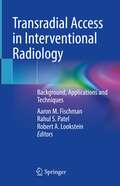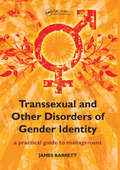- Table View
- List View
Transpersonal Perspectives on Spirituality in Social Work
by Edward R Canda Elizabeth D SmithUse these ideas in your social work practice to help the whole person--including your client's spiritual side!Transpersonal Perspectives on Spirituality in Social Work brings to light the fact that spiritual well-being is an essential part of the health of every individual. It will show you how to facilitate and encourage growth in the transpersonal dimension for your clients and help you to address the full range of human potential--from material and psychological well-being to spiritual fulfillment.Beginning with conceptual and theoretical frameworks for understanding transpersonal theory, Transpersonal Perspectives on Spirituality in Social Work goes on to deliver empirical and clinical studies that center on true-life experiences and their social work practice implications. In this well-researched book you will find: a comparative analysis of various models of spirituality and spiritual development a study of chronically ill adults that shows how people can draw upon transpersonal experiences and beliefs to increase their resiliency suggestions for alleviating death-related anxiety with a transpersonal/social constructionist approach theoretical, empirical, and practical insights into transpersonally oriented hospice work a model for transpersonal couples work that promotes compatibility and intimacy ways to differentiate between delusions, hallucinations, and real spiritual breakthroughs an examination of the different styles of spirituality of African Americans and European Americans and how they relate to the expression of violenceIn this well-referenced volume, practical techniques and suggestions combine with ways to work for justice and empowerment for marginalized and oppressed populations as well as insights about the fundamental connectedness between people and nature. Helpful diagrams, charts, and tables make the information user-friendly. Transpersonal Perspectives on Spirituality in Social Work will help you expand the horizons of your practice and provide more effective services to your clients.
Transplant
by John A. ElefteriadesWhat do you do when you have to choose between saving a life or saving yourself? Renowned cardiac surgeon Dr. Athan Carras's first concern has always been the welfare of his patients. Then he's approached by the very wealthy and even more powerful Terry Flynnt--a man who is used to getting what he wants, no matter what. Flynnt's son is dying, and his only chance of survival is to receive a donor heart--one that Terry intends to obtain by whatever means necessary. Athan is immediately opposed to performing an illegal and immoral operation, but Flynnt is not about to let that stop him. Now, caught in the crosshairs of a man with unlimited means and influence, Athan finds his own life--and the lives of those he loves--being torn apart. And he will have to decide how far he's willing to go, and what he is willing to sacrifice...
Transplant Administration
by Lisa NorrisThis timely new book, written by a transplant administrator with over sixteen years of experience, along with other expert contributors, covers the specifics of each aspect of transplant administration, providing information that will enable new administrators to quickly master essentials, help more seasoned administrators evaluate and improve their programs, and generally provide a knowledge base, focused on best-practices in light of regulatory requirements, for transplant surgeons, aspirant administrators and hospital administrators.Comprehensively covers all aspects of transplant program administration, including management, finance, staffing, quality improvement, patient intake, communication and collaboration with clinical staff, and more.Emphasizes practical application of best practices; uses bullet lists and other features to highlight essential information for each topic covered.Accompanying "Toolkit", available via the book's companion website, provides forms, a procedural manual, program assessment materials and more which buyers can use "out of the box" or adapt for use in their own program.While the book and its supplemental materials have been created specifically with the US transplant community in mind, they still have considerable value for transplant administrators and related professionals outside the US, for instance, transplantation and health policy researchers, hospital management staff who are tasked with starting a transplant program from scratch and who need ready-made materials they can adapt to suit their own regulatory environment, and others.
Transplant Immunology
by Anthony M. Jevnikar Xian C. LiWith all the complex issues of acceptance or rejection of a transplanted organ, immunology is a key subject for all transplantation clinicians. During recent years, there has been an explosion of research and knowledge in this area. Produced in association with the American Society of Transplantation, and written by experts within the field, Transplant Immunology provides a comprehensive overview of the topic in relation to clinical transplantation. Starting with the basic functionality of the immune system, it then moves on to cover the very latest developments in immunosupressive drugs and protocols, as well as a look at all emerging technologies in the field. Key chapters include: Transplant-related complications Immune responses to transplants Emerging issues in transplantation Biomarkers of Allograft rejection and tolerance T cells and the principles of immune responses In full colour throughout, over 100 outstanding diagrams support the text, all figures being fully downloadable via the book′s companion website. The result is an essential tool for all those responsible for managing patients awaiting and undergoing organ transplantation, including transplant surgeons and clinicians, immunologists and researchers.
Transplant Infections: Fourth Edition
by Per Ljungman David Snydman Michael BoeckhAs the number of patients undergoing hematotopoietic or solid organ transplantation increases, a deep understanding of the field of transplant infectious diseases grows increasingly vital. With its extensively revised and updated review of surgical infections, treatment, prevention, and practice, this book is the ultimate guide to advances in the field of transplant infections that are rapidly implemented into practice both in diagnostic technologies, new therapies, new transplant practices, and challenges such as the threat of multiresistant bacteria and the increasing use of transplantation in the developing parts of the world. Written by experts in their fields, this book is the only comprehensive source of cutting-edge information on transplant infections and has been a trusted guide to medical professionals worldwide for nearly two decades.Transplant Infections is of paramount value to infectious disease specialists, transplant physicians, medical students, fellows, residents, and all medical professionals working with surgical patients.
Transplant Psychiatry: A Case-Based Approach to Clinical Challenges
by Yelizaveta Sher Paula C. Zimbrean Catherine Crone Andrea F. DiMartiniThis book addresses the challenges clinicians face when working with patients facing complicated medical diagnosis for which transplantation is considered. Written by experts in transplant psychiatry, each chapter approaches a common psychiatric challenge faced by transplant candidates and recipients. Chapters meticulously share clinical expertise that provides a framework for future discussions without neglecting the fact that each transplant patient is unique in the complexity of their medical diagnosis. Additionally, the book examines complex issues including transplant-related posttraumatic stress disorder, post-transplant cognitive impairment, the collaboration between mental health and transplant clinicians, substance use and a wide range of other complicated topics.Transplant Psychiatry is an excellent case-based guide to mental healthcare delivery for all clinicians who may work with transplant patients, including psychiatrists, psychologists and mental health professionals, transplant surgeons, internal medicine specialists, hematologists, transplant social workers and transplant coordinators.
Transplant-Associated Coronary Artery Vasculopathy
by Rohit N. KulkarniCardiac transplantation has had a major impact on the quality of life and longevity of an ever-increasing number of patients. This benefit is significantly eroded by the development of an accelerated form of coronary arterial disease which shows some, but not all, of the characteristics of native coronary artery disease, and itself is one of the ma
Transplantation Imaging
by Ghaneh Fananapazir Ramit LambaThis book describes the multimodality imaging of cardiac, lung, liver, kidney, pancreas, and small bowel transplants in donors and recipients. The volume of transplantation of solid organs has increased substantially and has become common practice in medicine. Radiological evaluation of transplanted organs such as the heart, lungs, liver, pancreas, and kidneys is critical, both in potential donors (as is the case in liver and kidney transplantation) and in preoperative and postoperative evaluations of recipients. Understanding the often complex surgical anastomoses and unique pathology is necessary to inform radiologic interpretation. This book provides radiologists with the knowledge of the normal appearance of a transplanted organ, an understanding of imaging modalities that are best suited to answering clinical questions, an overview of the pathologies related to such organs and their appearance on various modalities, vascular and nonvascular complications, and techniques related to image-guided transplant interventions.
Transplantation Immunology
by Andrea A. Zachary Mary S. LeffellAfter decades of research in clinical transplantation, new techniques have been developed that permit a further understanding of the immune mechanisms underlying immune recognition of allografts and a more accurate and thorough evaluation of compatibility between donors and recipients. The second edition of Transplantation Immunology: Methods and Protocols expands upon the previous edition with current, detailed methods in transplantation immunology. The new methods chapters cover four major areas that are being applied in compatibility evaluations and ongoing transplantation immunology research. Seven overview chapters provide reviews of the molecular basis for alloreactivity, current understanding of humoral and cellular mechanisms, as well as new developments in thoracic organ transplantation, composite tissue transplantation and in the transplantation of sensitized patients. Written in the highly successful Methods in Molecular BiologyTM series format, chapters include introductions to their respective topics, lists of the necessary materials and reagents, step-by-step, readily reproducible laboratory protocols, and key tips on troubleshooting and avoiding known pitfalls. Authoritative and practical, Transplantation Immunology: Methods and Protocol, Second Edition is devoted to transplantation immunology, both in the practice of compatibility testing and in transplantation research.
Transplantation Immunology
by Philip HornickLeading clinicians and scientists in solid organ transplantation review the current status of the field and describe cutting-edge techniques for detecting the immune response to the allografted organ. The authors present the latest techniques for HLA typing, detecting HLA antibodies, and monitoring T-cell response, and examine more specialized methods utilizing proteomics, laser dissection microscopy, and real-time polymerase chain reaction. The area of tolerance induction and reprogramming of the immune system is also covered, along with a discussion of up-to-date methods of organ preservation, of today's optimal immunosuppressive drug regimens, as well as the difficulty of mimicking chronic rejection in experimental models. Introductory chapters provide a theoretical update on current practices in renal, liver, islet, and lung transplantation and on the pathways of antigen presentation and chronic rejection.
Transplantation Surgery (Springer Specialist Surgery Series)
by Nadey Hakim Mehmet Haberal Daniel MalufThis updated volume gives a clear description of transplantation surgery and covers the recent developments and innovations that have occurred within the field. New chapters on the management of graft dysfunction, organ preservation, new immunosuppressive drugs, molecular medicine and transplantation, robotics in transplantation, and organ bio-engineering are included.The book aims to be an authoritative guide to transplantation surgery that will help improve the likeliness of procedures being successful. This book will be relevant to transplant surgeons, physicians, and nephrologists.
Transplantation Surgery: A Companion To Specialist Surgical Practice (Springer Surgery Atlas Series)
by Gabriel C. Oniscu John L. R. Forsythe Elizabeth A. PomfretThis atlas provides transplant professionals with a step-wise approach to organ transplantation, illustrating the technical steps and highlighting practice points for each procedure. All aspects of abdominal and thoracic transplantation are covered, including organ retrieval, bench preparation and implantation. Separate chapters address specific technical issues for heart and lung, liver, kidney, pancreas and intestinal transplantation, providing detailed approaches to difficult situations. Technical variations are clearly explained, and tips are provided on how to ensure safe and efficient surgery. Transplant surgeons, trainees, fellows and other professionals involved in transplantation will find this book to be an ideal reference point. It has been written by an experienced international team of authors who have pioneered many of the techniques described.
Transplantation at a Glance (At A Glance Ser.)
by Michael Allison Christopher Watson John Dark Menna ClatworthyThe first basic overview of all aspects of transplantation with a clarity not to be found in more inaccessible textbooks. This brand new title provides a succinct overview of both the scientific and clinical principles of organ transplantation and the types of organ transplant, featuring highly-illustrated information covering core topics in transplantation including:Organ donorsOrgan preservationAssessment of transplant recipientsIndications for transplantationImmunology of transplantationImmunosuppression and its complicationsOverviews of thoracic and abdominal organ transplantation, including the kidneys, liver, heart and lungsTransplantation at a Glance is the ideal introduction for medical students, junior doctors, surgical trainees, immunology students, pharmacists, and nurses on transplant wards.
Transplantation of the Pancreas
by Rainer W. G. Gruessner Angelika C. GruessnerNow in its fully revised and expanded second edition, this textbook remains the definitive resource on pancreas transplantation. Enlarged, updated and improved, it consists of 93 chapters over 11 sections, with chapter authors who are recognized international leaders in their fields and represent institutions from five continents.Since the publication of the original edition in 2004, substantial progress has been made in the field of pancreas transplantation, specifically in regard to standardization of operative techniques and immunosuppression; significant improvements in patient and graft survival rates; and improved diagnosis and therapy of graft rejection and recurrence of disease. Pancreas transplants are no longer primarily performed in the USA and Europe for Type 1 diabetes mellitus; over the past 15 years, they have been performed with increasing frequency worldwide and also for Type 2 diabetes mellitus.The new edition of this textbook covers all aspects of pancreas transplantation: indications, recipient categories, surgical donor and recipient techniques, living donor transplantation, postoperative management and follow-up, post-transplant complications and malignancies, immunosuppression, treatment and diagnosis of rejection, impact on endocrine function and secondary complications of diabetes, recurrence of disease, quality of life, economic issues and overall outcome results. In addition, state-of-the art chapters focus on the classification, epidemiology and pathogenesis of Type 1 and 2 diabetes mellitus as well as on other beta-cell replacement therapies including islet auto- and allo-transplantation.This textbook is the primary reference on pancreas transplantation for transplant surgeons (established and in-training), pancreas and HPB surgeons, diabetologists, endocrinologists, gastroenterologists, pancreatologists and other health professionals with a focus on transplantation and diabetes (cardiologists, neurologists, urologists, ophthalmologists).
Transplanted: My Cystic Fibrosis Double-Lung Transplant Story
by Allison WatsonA poignant, witty memoir of learning to cope with a frightening genetic disease—and of a life transformed thanks to an organ donor.When Allison Watson awoke that day, she knew she was in a hospital bed. That's all. She had no idea how much time had passed since she’d seen her family. When she tried to focus, her vision was blurry, and when she tried to wave someone down, she became so exhausted she thought she was dying. Hours later, when Watson was able to communicate, she asked a nurse if the news was good or bad. “It’s good news,” the nurse replied. “You had your lung transplant four days ago.”Many cystic fibrosis patients are living longer today, thanks, in part, to transplants—though they are not easy to obtain. In this candid memoir, Watson describes living under the shadow of this incurable disease; her special bond with her sister, Amy, who also grew up with CF; and her life-altering surgery in Toronto in 2014. ; the r. Nor was the road to full recovery. In this book, Watson, who cycled across Canada with her brother in 2008 to raise awareness of CF, describes her journey.“Watson tells her resilient story of living with cystic fibrosis (CF), her progressive lung damage, the stress of waiting for an organ donor, her lifesaving transplant and life in the almost five years since her major surgery.” —The Guardian (Prince Edward Island, Canada)
Transplanting Care: Shifting Commitments in Health and Care in the United States
by Laura L. HeinemannThe sudden call, the race to the hospital, the high-stakes operation--the drama of transplant surgery is well known. But what happens before and after the surgery? In Transplanting Care, Laura L. Heinemann examines the daily lives of midwestern organ transplant patients and those who care for them, from pretransplant preparations through to the long posttransplant recovery. Heinemann points out that as efforts to control healthcare costs gain urgency--and as new surgical techniques, drug therapies, and home medical equipment advance--most of the transplant process now takes place at home, among kin. Indeed, the transplant system effectively depends on unpaid care labor, typically provided by spouses, parents, siblings, and others. Drawing on scores of interviews with patients, relatives, and healthcare professionals, Heinemann follows a variety of patients and loved ones as they undertake this uncertain and strenuous "transplant journey." She also shows how these home-based caregiving efforts take place within the larger economic and political context of a paucity of resources for patients and caregivers, who ultimately must surmount numerous obstacles. The author concludes that the many snags encountered by transplant patients and loved ones make a clear case for more comprehensive health and social policy that treats care as a necessarily shared public responsibility. An illuminating look at the long transplant journey, Transplanting Care also offers broader insight into how we handle infirmity in America--and how we might do a better job of doing so.
Transport Phenomena in Biomedical Engineering: Principles and Practices
by Joseph D. Bronzino Donald R. Peterson Robert A. Peattie Robert J. FisherDesign, analysis and simulation of tissue constructs is an integral part of the ever-evolving field of biomedical engineering. The study of reaction kinetics, particularly when coupled with complex physical phenomena such as the transport of heat, mass and momentum, is required to determine or predict performance of biologically-based systems wheth
Transport Phenomena in Multiphase Flows (Fluid Mechanics and Its Applications #112)
by Roberto MauriThis textbook provides a thorough presentation of the phenomena related to the transport of mass (with and without electric charge), momentum and energy. It lays all the basic physical principles, and then for the more advanced readers, it offers an in-depth treatment with advanced mathematical derivations and ends with some useful applications of the models and equations in specific settings. The important idea behind the book is to unify all types of transport phenomena, describing them within a common framework in terms of cause and effect, respectively, represented by the driving force and the flux of the transported quantity. The approach and presentation are original in that the book starts with a general description of transport processes, providing the macroscopic balance relations of fluid dynamics and heat and mass transfer, before diving into the mathematical realm of continuum mechanics to derive the microscopic governing equations at the microscopic level. The book is a modular teaching tool and is used either for an introductory or for an advanced graduate course. The last six chapters are of interest to more advanced researchers who might be interested in applications in physics, mechanical engineering or biomedical engineering. In particular, this second edition of the book includes two chapters about electric migration, that is the transport of mass that takes place in a mixture under the action of electro-magnetic fields. Electric migration finds many applications in the modeling of energy storage devices, such as batteries and fuel cells. All chapters are complemented with solved exercises that are essential to complete the learning process.
Transport and Safety: Systems, Approaches, and Implementation (Springer Transactions in Civil and Environmental Engineering)
by Geetam Tiwari Dinesh MohanThis volume addresses a variety of issues on traffic safety policy, ranging from issues of climate change, urban equity, and transport safety, in a broad global and societal context, while retaining situation-specific details. Written by international experts on issues of transportation and traffic safety, it will be of special interest to advanced researchers in the engineering and planning disciplines working on these issues as well as policy makers concerned with setting up institutions and legislations for traffic safety.
Transporters and Drug-Metabolizing Enzymes in Drug Toxicity
by Albert P. LiThis book provides a comprehensive and up-to-date coverage of the relationship between drug metabolism enzymes and transporters on drug toxicity, along with methods to investigate their role on adverse drug reactions. Unites both the metabolism and transporter components of drug toxicity – two aspects not normally connected and the latter often neglected Familiarizes readers with the mechanism and species differences in drug metabolizing enzymes and transporters Discusses promising approaches to accurately predict human drug toxicity via the incorporation of human drug metabolism in toxicity evaluation
Transporters as Drug Targets
by Raimund Mannhold Gerd Folkers Harald H. Sitte Gerhard F. Ecker Helmut Buschmann Rasmus P. ClausenAs opposed to other books on the topic, this volume is unique in also covering emerging transporter targets. Following a general introduction to the importance of targeting transporter proteins with drugs, the book systematically presents individual transporter classes and explains their pharmacology and physiology. The text covers all transporter families with known or suspected importance as drug targets, including neurotransmitter transporters, ABC transporters, glucose transporters and organic ion transporters. The final part discusses recent advances in structural studies of transport proteins, assay methods for transport activity, and the systems biology of transporters and their regulation. With its focus on drug development issues, this authoritative overview is required reading for researchers in industry and academia targeting transport proteins for the treatment of disease.
Transporters in Drug Development
by Yuichi Sugiyama Bente SteffansenTransporters in Drug Development examines how membrane transporters can be dealt with in academic-industrial drug discovery and pharmaceutical development as well as from a regulatory perspective. The book describes methods and examples of in vitro characterization of single transporters in the intestines, liver and kidneys as well as characterization of substrate overlap between various transporters. Furthermore, probes and biomarkers are suggested for studies of the transporters' impact on the pharmacokinetics of drug substrates/candidates interacting on transporters. The challenges of translating in vitro observed interaction of transporters into in vivo relevance are explored, and the book highlights perspectives of applying targeted proteomics and mechanistic modeling in this process.
Transportome Malfunction in the Cancer Spectrum: Ion Transport in Tumor Biology (Reviews of Physiology, Biochemistry and Pharmacology #181)
by Christian Stock Luis A. PardoThis is the first of three volumes in the "Ion Channels & Transporters in Tumor Biology" collection, which discusses the function of ion transport proteins in cellular and systemic homeostasis. The authors highlight the role of the so-called transportome, which is defined by the entirety of ion transporters and ion channels. Thereby, readers will get a better understanding of the impact dysregulated ion transport has on the whole spectrum of cancer types. Cancers display deficiencies in several, sometimes interdependent members of the transportome.Clinicians will be interested in the fact that controlled expression of ion transport proteins dramatically impacts the life span of cancer patients, as shown in recent studies. These observations offer a promising outlook for biomedical scientists, as members of the transportome could be the tumor markers of tomorrow - both for diagnostic and therapeutic purposes.As part of a three-volume collection, this book will fascinate members of the active research community, as well as clinicians from the cancer field.
Transradial Access in Interventional Radiology: Background, Applications and Techniques
by Aaron M. Fischman Rahul S. Patel Robert A. LooksteinThis book provides how-to recommendations and detailed guides for using transradial access in interventional radiology. A relatively new and growing technique, transradial access is most commonly found within interventional cardiology. This book approaches those cardiac uses of transradial access while extending its use to other body sites and disease states. The book details the interventional radiologist’s transition to using transradial access across a broad spectrum of clinical applications, allowing them to better introduce it into their practice and to their patients. The text is divided into three sections: overview, clinical applications, and novel applications and techniques. The first section covers the history of transradial access, the initial patient assessment, and how to prepare for a procedure. The second section is divided into different diseases and interventional situations where transradial access could be considered, including subclavian artery stenosis and endovascular neurosurgery. The third section includes coverage of how to perform the latest techniques and projections for future procedures. This guide provides a manual of operations to assist in the setup of the practice, from office visit to procedure room to recovery across a variety of service lines and patient populations. Key take home points and equipment summaries accompany each chapter, allowing the user to easily navigate the book to accelerate his or her practice. This is an ideal guide for interventional radiologists.
Transsexual and Other Disorders of Gender Identity: A Practical Guide to Management (Radcliffe Ser.)
by James BarrettFor the vast majority of children acquiring speech and language skills is an effortless process. However there is a sizeable proportion of children for whom this is not true. Difficulties they experience may be associated with other conditions such as cleft palate or hearing loss or they may have no obvious cause. This book provides a comprehensive picture of the difficulties that occur when speech and language does not develop in the young child. Divided into two sections the first focuses on how such children should be identified and assessed. The second section provides specific insights into communication difficulties in different conditions. Each is written by an expert practitioner and is illustrated with specific examples. Based on best clinical practice and research-based evidence it is a practical guide fully referenced for those who wish to develop knowledge further. It is essential reading for all professionals who work with children particularly those who work in community settings.
